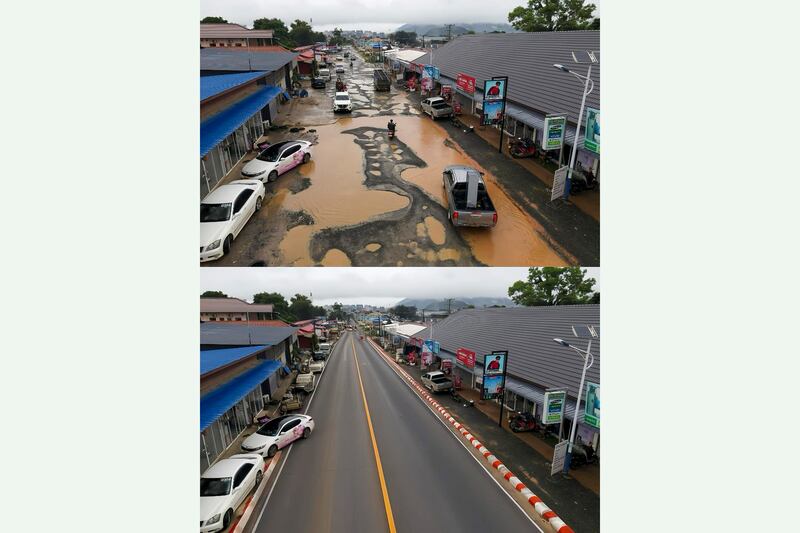Authorities in Laos detained two young men who posted a video on social media poking fun at the sorry state of the roads in their town, according to residents.
The pair of graphic artists – going by their adopted Western-sounding screen names of Dai James and James Famor – uploaded an artificial intelligence-generated video to Facebook last week showing them fishing in water-filled potholes on a street, surrounded by crocodiles – a video that went viral in Laos.
In response, police on Aug. 28 handcuffed the two and took them into custody in Tonpheung, a port town on the Mekong River that is home to the Golden Triangle Economic Zone, or SEZ, in northwestern Laos’ Bokeo province on Aug. 28.
Authorities released James the same day, but required Famor to attend a “re-education” class, and forced him to confess and apologize before freeing him on Monday.
A friend of Famor who works at the studio where they produce and post videos to social media confirmed the arrest and release to RFA Lao on Tuesday.

“They were released on different days – the first one, Dai James, was released on August 28 and the other was freed on Sept. 2,” said the friend who, like others interviewed for this report, spoke on condition of anonymity due to security concerns.
“From now on, we [the studio] can’t post or produce anything at all.”
‘Confession’ and ‘apology’
In a video posted to Facebook on Monday, following his release, Famor apologized to the police for his actions.
“I would like to confess that on Aug. 8, I took photos of a damaged road filled with potholes and water, and then I cut and pasted some photos of crocodiles into the middle of the road,” he said.
“At the time, I didn’t intend to campaign against anybody … Now, I admit that what I did was wrong.”
Famor also “thanked” authorities who “warned and re-educated me,” saying he had learned an important lesson.
“In the past, I’ve posted a lot of videos, but this time, posting that video was a big mistake and for that I apologize to all relevant authorities,” he said. “I would like to ask all my followers to understand that the party and government’s warning is a good lesson for me.”
RELATED STORIES
[ Lao central bank governor removed amid economic crisisOpens in new window ]
[ Lao authorities raid more Golden Triangle scam centers as deadline passesOpens in new window ]
[ Laotians post images of miscalculated US$4,000 power bills to social mediaOpens in new window ]
[ Laos Appoints New Electricity Chief Amid Growing Anger Over High PricesOpens in new window ]
RFA spoke with an officer at the Bokeo Province police department who referred questions about the case to authorities in Topheung, but attempts to contact the district station went unanswered.
The men appeared to have violated Article 117 of the Lao Criminal Code, which says that persons who “campaign against the Lao PDR by twisting the policy of the [ruling Communist] Party and government, releasing destructive news causing disorder, speaking, writing, printing, posting photos, videos and texts via electronics means or otherwise, will be jailed from one year to five years, and fined from 5 million to 20 million kip (US$225 to $900).”
Lighten up
Residents and experts said the police reaction was excessive and wrong, and that the young men were actually helping improve everyone’s lives by highlighting a problem the government appears unwilling to address.
“Everybody knows that the roads here in Tonpheung district are bad,” a resident of the town said. “They were accused of defaming the party and government when, actually, it’s the party and government that are in denial.”
“The SEZ is an economic hub, but look at the roads – they’re terrible.”
The Golden Triangle refers to the largely lawless area where Thailand, Laos and Myanmar meet that has recently become notorious for methamphetamine production. The neighbors have tried to promote trade and tourism with economic zones, while casinos and online scam centers have also proliferated on the Lao and Myanmar sides of the Mekong.

Another resident of Tonpheung agreed that the police response was “inappropriate.”
“These guys just posted a video showing damaged roads on social media using AI,” he said. “The post reflects the real conditions of the roads in our community ... Many people complain about these roads, even though they know that nothing will happen and nothing will be fixed.”
Social media as a reporting tool
Others suggested that the authorities should welcome such posts, as they may not be aware of such issues.
“In this day and age, it’s normal for people to post something like that on social media, and the Lao people should have some freedom to do that – they shouldn’t be threatened or arrested,” said a professor at Souphanouvong University in Luang Prabang province.
“The authorities should be looking for a solution to the problem, not for a way to punish them,” he said. “It’s not right to arrest, detain or even fine them.”
People in Laos frequently turn to social media to draw attention to problems that the authorities ignore or that state-run media are unwilling to report on.
Last month, residents and business operators near the Lao capital Vientiane posted images of their outrageously high electricity bills on social media after an apparent miscalculation by the state-owned power company.
Some business owners in Vientiane province’s Thoulakhom district received monthly bills as high as US$4,000 from the state-run Electricite du Laos – 10 times the usual US$400.
Electricite du Laos’ district office quickly issued a follow-up notice, saying that bills for July had been miscalculated, and a corrected invoice would be sent soon.
Translated by RFA Lao. Edited by Joshua Lipes and Malcolm Foster.
